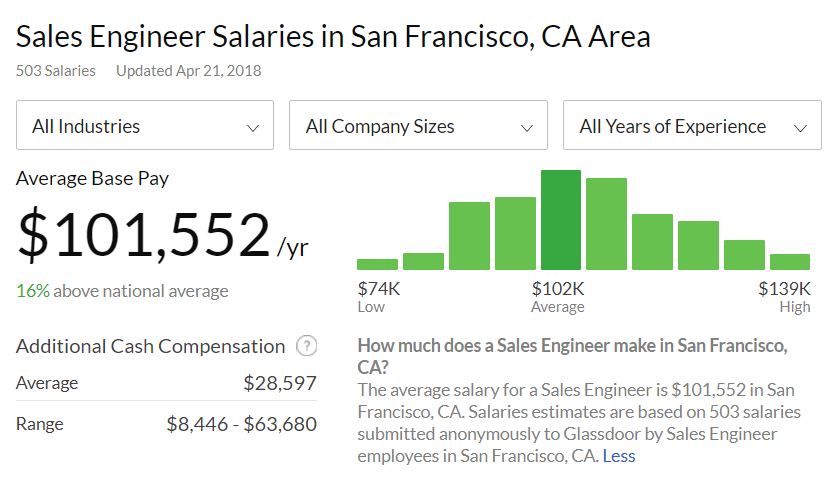Sales Engineer Career Path
Skills, Salaries, and Opportunities
Wherever the need for technical, business, and people skills converge, you’ll likely find a rare breed of talent: the sales engineer.
The rigorous career path sales engineers take may not readily appeal to everyone but are easily among the most lucrative. It certainly takes a lot to be a sales engineer. But for the best of these specialists, the effort is well rewarded.
The U.S. Bureau of Labor Statistics reported that the median wage for sales engineers clocked in at US$98,720 as of May 2017, with professionals in the wholesale electronics, computer systems design, and telecommunication sectors reeling in six-figure salaries. The top 10% of sales engineers across industries earned north of US$160,000.
But even more valuable than their hefty compensation, sales engineers tread a challenging career path that straddles the sweet spot between the human and the technical side of sales. They also get the opportunity to become experts at the diverse skills required to be competent in their craft. They develop bit-level, nut-and-bolt understanding of business solutions and learn the techniques of impactful marketing and customer engagement, enabling them to establish trust and meaningful connections with people and organizations.
Lastly, sales engineers are not constrained by a rigid, single-track career path. Instead, they can choose to stay within their domain and provide leadership as senior sales engineers, move up in the organization as part of management, or transition laterally as a valuable resource for other teams such as marketing, product development, customer success, and research.
What is a Sales Engineer?
Sales engineers are specialist professionals trained in the precise language of technology, the core aims of businesses, and the fluid behavior of customers. They bring clarity to clients’ technical needs, help fine-tune solutions to address those needs squarely, and assist sales teams in articulating product value on multiple levels.
Depending on their functional focus, sales engineers either complement reps, account executives, and other peers from the sales department during customer engagements; or serve in the field as quota-carrying, commission-earning sellers themselves. In either case, sales engineers are involved in selling sophisticated equipment, software, hardware, industrial, and other technological products and services.

Sales Engineer Duties
Sales engineers perform many tasks similar to those assigned to other sales professionals: generate interest in their product, conduct market research, manage customer queries, and close deals. In addition to these tasks, however, sales engineers also—
- Give technical demos and presentations;
- Gather customers’ technical requirements;
- Help tailor complex solutions to fit specific customers’ unique situations; and,
- Train customers in the installation, use, and optimizations of technology solutions.
Some sales engineers also work with Product Development to evolve existing services or create new ones based on customer feedback and their own experiences in the field.
What Skills Does a Sales Engineer Need?
To be excellent at what they do, these specialists need to have a deep, extensive knowledge of their products and services and the business acumen, interpersonal skills, and customer empathy required to connect solutions and buyers positively.
Most sales engineers have at least a bachelor’s degree in a STEM-related field (science, I.T., engineering, mathematics). On the other hand, competent sales engineers with different academic backgrounds compensate for their lack of formal technical education with extensive training and field experience. Not all sales engineers started as technology-related professionals. A few were former sales reps or account executives who liked technology and were determined to learn, train, and get extensive experience in technical sales.
In any case, sales engineers should be continuously learning and re-training, given the rate of change and disruption in the digital economy. Sales engineers can’t afford to be caught off guard when the technologies they are selling or the sales techniques they are using suddenly become obsolete or irrelevant in the emerging priorities of the business.
How much do Sales Engineers Earn?
Compared to their peers in the sales department, who earn a median annual income of US$27,020, sales engineers receive more than three times as much at $98,720. This paycheck is also much higher than the average U.S. salary of US$37,690 for all occupations.
And that’s just the average. The most competent and experienced sales engineers easily bring home six-figure salaries, with some exceeding US$162,740.
However, Glassdoor reported that avg. base for sales engineers is $101,552 (as of April 2018).

Possible sales engineer career tracks
There is no single route that can define the sales engineer career path. Instead, sales engineers can opt to take any of the following tracks:
- Senior sales engineer.
- Full sales role.
- Lateral transition to a new business unit.
- Sales management.
- Entrepreneurship.
1) Senior-Level Sales Engineer
Like many other roles, sales engineers often transition from a base rank (e.g., technical sales trainee) to higher ranks characterized by greater responsibilities or degree of specializations (e.g., associate sales engineer, corporate sales engineer, senior corporate sales engineer, team lead, etc.).
Sales engineers who have become subject matter experts provide insight, leadership, and guidance in the sales organization. In addition, veteran sales engineers can handle — and are often given — the responsibilities of team leads and managers. Technologist and investor Robert Schneider wrote that many professionals remain happy and contented sales engineers for decades.
2) Full Sales Position
Some sales engineers may also want to reap the hefty commissions earned by accomplished sales reps in their sales force. Shifting to a full sales role has its share of perils, however. According to John Care of Mastering Technical Sales, the failure rate of sales engineers turned full sales reps hovers around 72.5% within two years. It is possible for sales engineers to still succeed as full-time sellers only if hardcore selling is their true passion.
3) Lateral Transition to a New Business Unit
It is not uncommon for competent sales engineers to apply their sales and technical skills in other fields such as product development, marketing, post-sales (e.g., customer success, technical support), and research. In some cases, it is possible to transition into and join the new unit altogether as a valuable resource with many field secrets to share.
4) Sales Management
Successful sales professionals are inherently ambitious, and their central skills (strategic, communication, marketing, leadership, customer engagement) equip them for more significant and impactful roles. Sales engineers are no exception. They already possess the required skills to sell an idea and the technical background to articulate just how exactly the idea will solve a customer’s pain point. Because they also have business acumen, veteran sales engineers can aim to eventually serve in the C-suite by delivering exceptional value to their organizations.
5) Entrepreneurship
A well-rounded skill set that covers business, people, and technology is a foundational element for creating successful startups in the digital economy. Veteran sales engineers can use their learnings and experience to create their solutions and build their own client portfolios. The only challenge is to ensure zero conflict of interest/ breach of contract/intellectual property infringement with your former employer, primarily if you are serving the same market or offering similar solutions/products.

The Job Outlook for Sales Engineers
The official projection for sales engineers remains modest at 7% job growth, representing 5,000 new sales engineering jobs to be generated in the U.S. from 2016 to 2026. While this is just about the average job growth for all occupations, the statistic does not highlight the real benefit of taking the career path of a sales engineer. The skills that make sales engineers tick are transferable credentials that will enable a professional to excel in just about any other field. That’s because the triad skill sets of technology, business, and people are exactly the same ingredients needed to drive success in tomorrow’s job markets.
Are you looking for sales engineering jobs? Apply to be a Rainmaker and start connecting with companies now!










